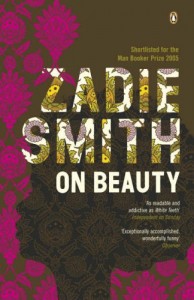 In her collection of essays Changing My Mind, Zadie Smith describes a line delivered by the actress Katharine Hepburn in the movie The Philadelphia Story as being her lodestar for fiction writing: “The time to make up your mind about people is never!” As far as fiction writing mantras go, this is among the best I’ve heard, and it goes a long way towards explaining her chief asset as a writer, on full display in On Beauty: her ability to create vivid and believable characters. This is a book of adultery, of lies, half-truths and manipulations, but its author declines the easy path of judgment and condemnation, instead presenting each malfeasance in a context that makes the characters more relatable, more flawed and, therefore, more human. These characters matter to their author, and the novel’s chief pleasure lies in the steady way she coaxes us to share in that love.
In her collection of essays Changing My Mind, Zadie Smith describes a line delivered by the actress Katharine Hepburn in the movie The Philadelphia Story as being her lodestar for fiction writing: “The time to make up your mind about people is never!” As far as fiction writing mantras go, this is among the best I’ve heard, and it goes a long way towards explaining her chief asset as a writer, on full display in On Beauty: her ability to create vivid and believable characters. This is a book of adultery, of lies, half-truths and manipulations, but its author declines the easy path of judgment and condemnation, instead presenting each malfeasance in a context that makes the characters more relatable, more flawed and, therefore, more human. These characters matter to their author, and the novel’s chief pleasure lies in the steady way she coaxes us to share in that love.
Howard Belsey is a white, unabashedly liberal academic specializing in the life and works of Rembrandt, whose thirty year marriage to his black Jamaican wife Kiki, with whom he has three children – Jerome, Zora and Levi – has been on a steady decline, precipitated by his affair with a colleague and mutual (white) friend of his wife’s, Claire Malcolm. Howard has a doppelganger in Monty Kipps, a black Christian conservative Rembrandt scholar of much greater renown than Howard, who has a daughter, Victoria, enrolled in Howard’s Rembrandt class. The novel follows the fortunes of all the above-mentioned characters, but its principle focus is on Howard and Kiki and their marital strife; together they form the novel’s emotional center.
From this complex cast of characters and connections, Smith weaves a plot that encompasses the liberal-conservative academic and political divide, the struggles of racial identity and the difficulties of maintaining and cultivating love and monogamy. On racial identity, in particular, Smith’s acuity shines, as the Belsey children struggle between two competing views of blackness. The first, advanced by Monty Kipps, is that the color of one’s skin confers no identity, a seemingly reasonable proposition; for Monty, identity is a reflection of character, of opinions and values, something to be forged. Howard’s reply – “Tell that to the KKK” – exemplifies the typical rejoinder: being black means involuntarily partaking in a shared history and culture, and degradation imposed on a people for no other reason than the color of their skin. Thus Levi, the youngest of the three, slurs his speech and affects an urban accent and idiom, and seeks out a group of Haitian immigrants who labor, legally and illegally, for subsistence wages, while Zora, the middle-child, finds such affectations phony, even demeaning, and never misses an opportunity to let Levi know.
The novel is not without its weaknesses. The racial tensions are handled with nuance and insight, whereas the political ones rarely transcend the level of caricature, and while Smith’s ultimate ambiguity on the topic of race – is race a component of identity? should it be? – seems wise, the same indecisiveness in the political arena, where the stakes are no less high, smacks of cowardice. There were also one or two exchanges of dialogue that were gratingly inauthentic, and were all the more jarring because Smith has a wonderful ear for dialogue, for capturing with equal felicity the inflections of Haitian rappers and tenured academics. But these criticisms are nitpicking. Taken as a whole, On Beauty is ambitious, elegantly composed and deeply entertaining, delighting equally in eliciting laughter and tears and providing ample testament to Zadie Smiths’ considerable gifts.